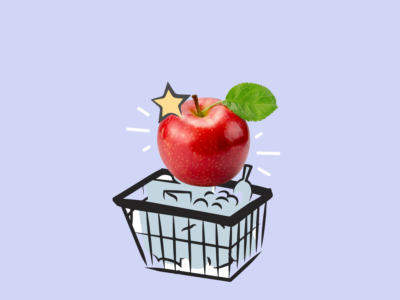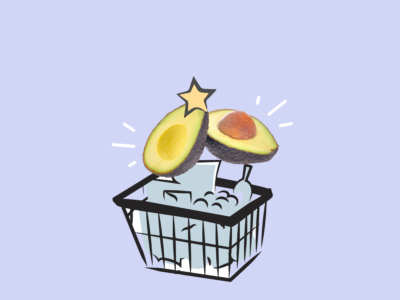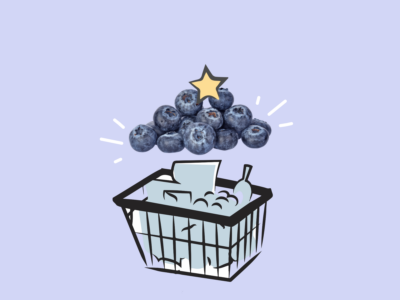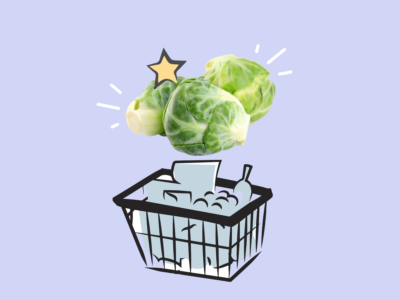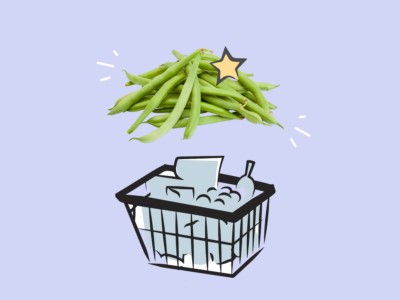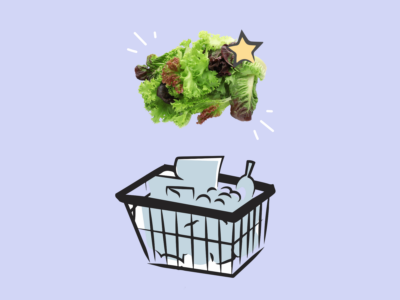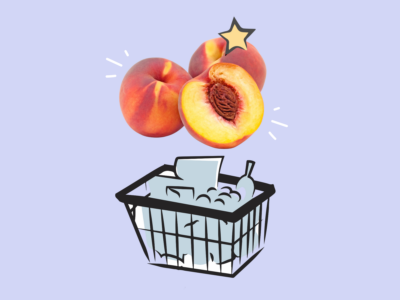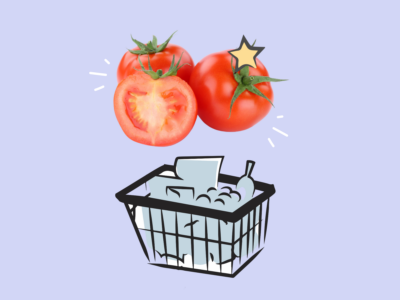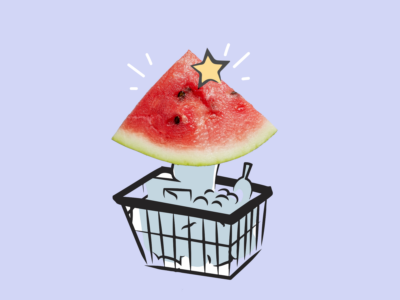Cucumbers are warm-season veggies with a long growing time, making them a popular find at late-summer farmers markets. Thanks to their widespread cultivation, fresh cucumbers are available year-round at nearly any grocery store.

When shopping, choose cucumbers that are uniformly dark green, firm to the touch, and free from blemishes or soft spots. Avoid cukes with wrinkled skin or a mushy texture—these are signs of moisture loss or spoilage. The blossom end should be rounded, not shriveled or sunken. If there’s a noticeable bulge in the middle, it likely means a large seed cavity, which can affect crispness. In general, larger cucumbers have more seeds – so look for smaller, thinner cucumbers such as Persian cucumbers or pickling cucumbers. You might also come across English cucumbers, often sold in plastic wrap—these are great for slicing due to their mild flavor and nearly seedless flesh.
The best way to store cucumbers is to wrap them in a moist paper towel, then loosely place them in a produce bag or plastic bag in the crisper drawer of your refrigerator. This protects them from high humidity while allowing some airflow, helping them stay crispy, crunchy and fresh. They taste best when eaten soon after picking. If you don’t have access to fresh-from-the-vine cukes, they should last for about a week in the fridge uncut. However, the sooner you eat them, the better they’ll taste! Cucumbers are sensitive to ethylene gas, so keep them away from fruits like bananas, tomatoes, and melons in order to prolong their shelf life. Avoid storing cucumbers at room temperature on the countertop for long periods—especially for sliced cucumbers. Once cut, wrap tightly in plastic wrap or place in an airtight container in the fridge, and use within a few days.
How to Preserve Cucumbers
If you find yourself with a surplus of cucumbers, there are lots of way to preserve them for future use.
Freezing
Believe it or not, you can even freeze cucumbers! The only down-side is the texture will be different once thawed (think mushy and soggy!). If you’re still game, the process is fairly easy. First off, wash and dry cucumbers, then peel if desired. Then, slice them and put the cucumber slices on a lined baking sheet in the freezer for a few hours before transferring to a freezer-safe airtight container or resealable bag. Frozen cucumbers can be added to smoothies and soups, used to infuse water or to prepare dips, like tzatziki. Use within 6 months for best quality.
You can even try de-hydrating cucumbers, to create a sort of cucumber chip!
Want to preserve your cucumbers in a more flavorful way? Try pickling!
Pickling
You can preserve cucumbers by preparing your very own naturally-fermented pickles! It’s easy and they are so, so, good for you!
To do this, simply:
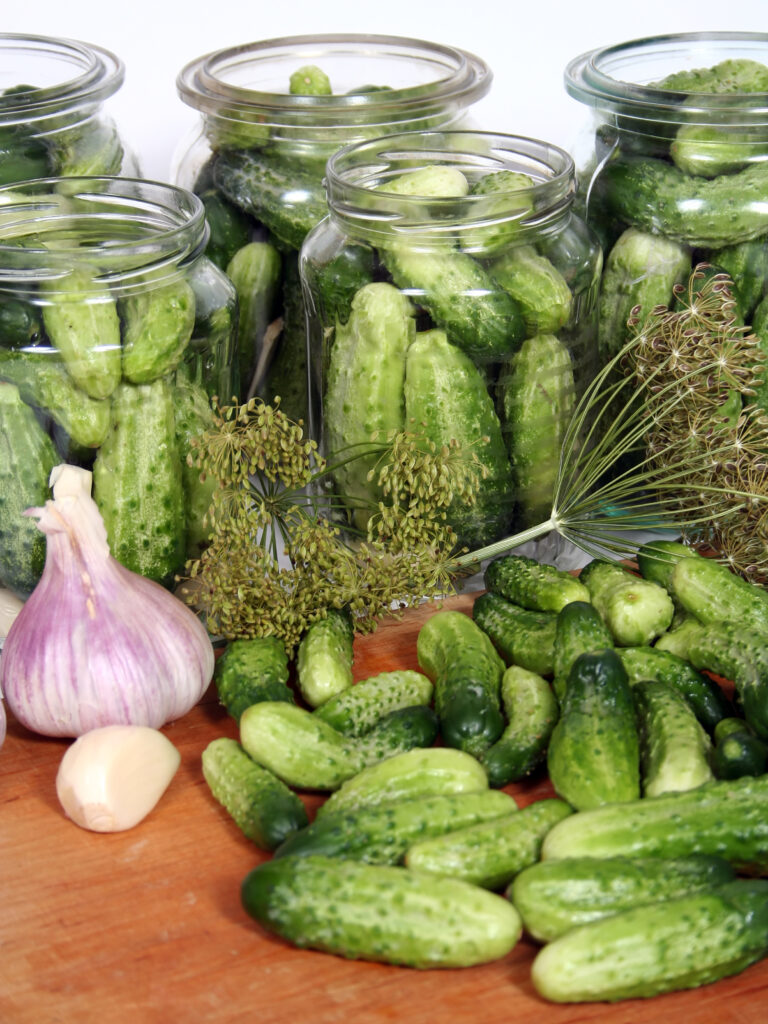
- Wash, dry, and cut cucumbers if they are large. Otherwise, leave them whole. If you can, choose a pickling variety as they tend to have thinner skin and lower moisture content.
- Pack them tightly in fermentation crock or mason jars (make sure these are very clean!), leaving about 2 inches of headspace.
- If desired, add spices based on your taste preferences (for e.g., garlic, dill, peppercorn etc.). The addition of tannins to the ferment will help get crispier pickles. For example, you can add grape leaves or black tea leaves.
- Make a 3.5% salt brine solution (mix 33 grams of salt with 4 cups of water). Use a non-iodized, pure salt (such as Himalayan or Celtic sea salt) and make sure to use non-chlorinated water (it will kill the bacteria needed for fermentation).
- Pour the brine over the cucumbers, making sure they are completely covered. Put a weight on the cucumbers to ensure they are below the brine. A clean glass jar, slightly smaller in diameter than the mouth of your fermentation vessel, filled with water works well. If you are using a fermentation crock, use the weight that comes with it. Add the lid. If using mason jars try an easy fermenter lid (it will let the gas escape, so you don’t have to ‘burp’ the jars).
- Store in a cool, dark place for a week or so. Signs that fermentation is taking place include: bubbles forming in the jar, the liquid will get cloudy, and the color of the cucumber skin will darken. Test to see if they have fermented to your liking. If so, replace the fermenting lid with a regular lid and store in the fridge.
Cucumbers can also be pickled in vinegar, for short-term storage in the refrigerator (and therefore sometimes referred to as refrigerator pickles) or canned for long-term shelf-stable storage. While it’s true that these make for a tasty snack and help save your cucumbers from spoilage, cucumbers pickled in vinegar aren’t full of healthy bacteria. For maximum health benefits, your best bet is to stick with naturally fermented pickles so you don’t miss out on the opportunity to give your gut some extra lovin’! If you aren’t up for the challenge of doing this on your own, you can purchase fermented pickles at the grocery store (sometimes labelled as half-sour or sour pickles) – Bubbies is a popular brand of naturally-fermented kosher dill pickles (they have fermented relish too) as is the Canadian brand Moishes (which you can even find at Costco!)
To help you make the best choice, here is a break-down comparing popular types of pickles!
- Bread-and-butter Pickles: A type of sweet pickle, prepared in a solution of vinegar, sugar, and spices such as celery seed and coriander, for a tangier taste. They can be chilled as “refrigerator pickles” or canned.
- Dill Pickles: Prepared in vinegar, flavored heavily with dill weed and dill seed.
- Gherkin Pickles: Pickles made from a small variety of cucumbers (typically 1 to 5 inches (2.5 to 13cm) in length), with bumpy skin. Gherkins can be pickled in different ways. For instance, cornichons are tart French pickles made from gherkins pickled in vinegar and tarragon, while sweet gherkins are prepared in pickling brine containing sugar.
- Kosher Dill Pickles: The name does not refer to the fact that these pickles have been prepared in accordance with Jewish dietary law, but comes from the fact that these pickles are prepared in the traditional manner of New York City Jewish delis, with LOTS of garlic and dill, fermented in natural salt brine.
- Sweet Pickles: Prepared in a mixture of vinegar, sugar, water, and spices such as mustard seed, cinnamon, and onion.
With all these cucumber-preserving options, there’s no reason to let even one go to waste!
Shop Like a Pro
If you’re looking for tips on how to shop, select and store other foods check out these posts!




